Why Your Bloated Tummy Is More Than Just A Food Baby
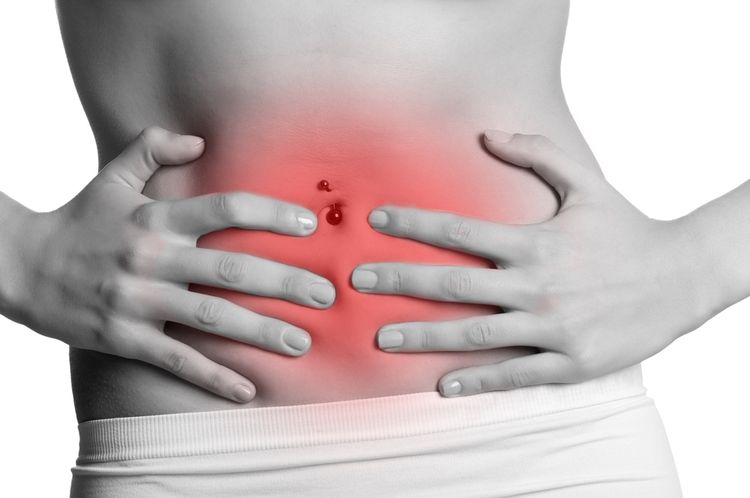
“That meal really hit the spot, but boy do I feel bloated now!”
Many of us have uttered those exact words, especially around holiday time. Not only can it be embarrassing to walk around with a rounded belly that protrudes excessively outward, it can also be somewhat debilitating.
At one point or another, we’ve all experienced the feeling of having no room to ingest anything else. But some people certainly seem to experience it more than others. Why is that? And why does it even occur in the first place?

What Exactly is Bloating?
Bloating is often described as an uncomfortable feeling of fullness, tightness, or swelling in the belly. It’s a common condition, affecting up to 30 percent of adults in the United States.
When you’re bloated, you may pass frequent, foul-smelling gas and be more apt to burping. Your stomach may gurgle and rumble quite loudly, to the point where others can hear it if you’re sitting in a quiet room with them. For some people, their stomach just becomes swollen gradually after a meal or throughout the day. Visible swelling (distention) of the abdomen can make you look and feel as though you’re a few months pregnant.
Being bloated is uncomfortable, since the gases producing it increase abdominal pressure, placing excess pressure on the organs and causing pain, not to mention tight pants!
Bloating can also be caused by retaining fluids as a product of hormone imbalance, inadequate organ function, or inflammation.
How Does Bloating Occur?
There are several factors that can contribute to bloating—from what you eat or drink to intestinal conditions or infections. Here are some of the common sources of bloating:
Water Retention: In order for your body to function properly, it requires a precise amount of water. Your kidneys are responsible for maintaining water balance, but the pituitary gland assists in this process by secreting an antidiuretic hormone (ADH), also called vasopressin. When ADH is released into your bloodstream, it helps prevent your kidneys from losing water. If you’re dehydrated, the hormone instructs your kidneys to hold on to more water for survival.
This mechanism should automatically detect your hydration levels and turn the kidneys off when you’ve had enough water, but for reasons not completely understood, the regulatory actions that control ADH production don’t always turn off even when the body has enough water. This can lead to fluid retention, called edema, and cause chronic abdominal swelling. Too much salt, sugar, or carbohydrates can cause water retention as well.
Imbalanced Gut Flora: This occurs when the amount of good bacteria is low relative to bad bacteria, yeast, parasites, and viruses. A diet high in sugar, refined carbohydrates, and alcohol can result in bloating when the bad flora digest the carbohydrates and ferment them, producing gas. This gas can build up throughout the day, leaving you looking like you are 6 months pregnant.

Impaired GI function and Gastroparesis: Gastroparesis occurs when the vagus nerve, which sends signals from the brain to the digestive tract, malfunctions, causing digestive motility to either slow down considerably or simply stop altogether.
Bloating can occur when the food and waste that is not moving through the gut is fermented by microorganisms producing gas. Gastroparesis is associated with diabetes, autoimmune conditions, anorexia, bulimia, neurological disorders, infection, and decreased levels of stomach acid.
Similarly, impaired GI function that would accompany low stomach acid, digestive enzyme, and bile acid production will also contribute to bloating by slowing the process of digestion down too much or by allowing inadequately digested foods through the gut to be fermented by bacteria or yeast.
Inflammation from Food Sensitivities and Chronic Illnesses: Food sensitivities and allergies arise for a variety of reasons, but the underlying mechanism is an immune response that produces inflammation, both locally in the intestinal lining as well as systemically. This inflammation causes you to become puffy and bloated. Similarly, many cancers and liver, heart, kidney, and gastrointestinal diseases or infections can cause bloating due to the inflammation brought on by the illness, changes in nutrient status, tumors, and poor organ function.

Acute vs Chronic Bloating
There are two distinct types of bloating:
Acute: Sudden bloating can be the sign of a serious medical condition, such as ascites. Ascites is an abnormal and rapid buildup of abdominal fluid. This can cause your waistline to expand virtually overnight, resulting in bloating and sudden weight gain. Ascites is commonly caused by liver diseases such as hepatitis or cancer.
Dr. Robynne Chutkan, MD, FASGE explains that acute abdominal bloating may be the result of several others types of cancers including uterine, ovarian, pancreatic, colon, and stomach.1
Acute bloating may also be a sign of Crohn’s disease, Celiac disease, ulcerative colitis, pelvic inflammatory disease, or diverticulitis. Dr. Chutkan warns if belly bloat is accompanied by fever, severe pain, sudden weight loss (or gain), ascites, or passing of blood in the stool, professional medical attention should be sought immediately.1
Chronic: When you experience chronic bloating, it seems as though your stomach is uncomfortably distended most or all of the time. It may be worse after a meal or build up throughout the day. Chronic bloating often leads to burping, belching, flatulence, and gurgling intestines and is related to diet or GI infection.

Root Causes of Bloating
Bloating has several potential root causes that range from dietary factors and gut function to gut flora and hormone balance.
Poor Digestion: Not chewing your food, eating too fast, and insufficient HCl, digestive enzyme, and bile production are all factors that can cause bloating.
Diet: Processed foods, consuming lots of sugar and carbohydrates, excessive fiber, and too much salt or alcohol can increase gas production, leading to bloating.
Food Sensitivities and Allergies: Food sensitivities result in bloating, since such foods can’t be broken down and absorbed as they should be. Instead, they cause inflammation leading to more potential sensitivities.
Dysbiosis: Not having enough of the good bacteria or having a GI infection can cause bloating, since the good bacteria help us break down our food properly. Organisms such as yeast, parasites, and the bad bacteria will also ferment food, producing gas. They can even produce gas when you haven’t eaten.
Chronic Conditions: Conditions that alter proper GI function such as Crohn’s, IBD, or Lyme disease can produce bloating. Impaired kidney and heart function, as well as certain cancers can also bloating.
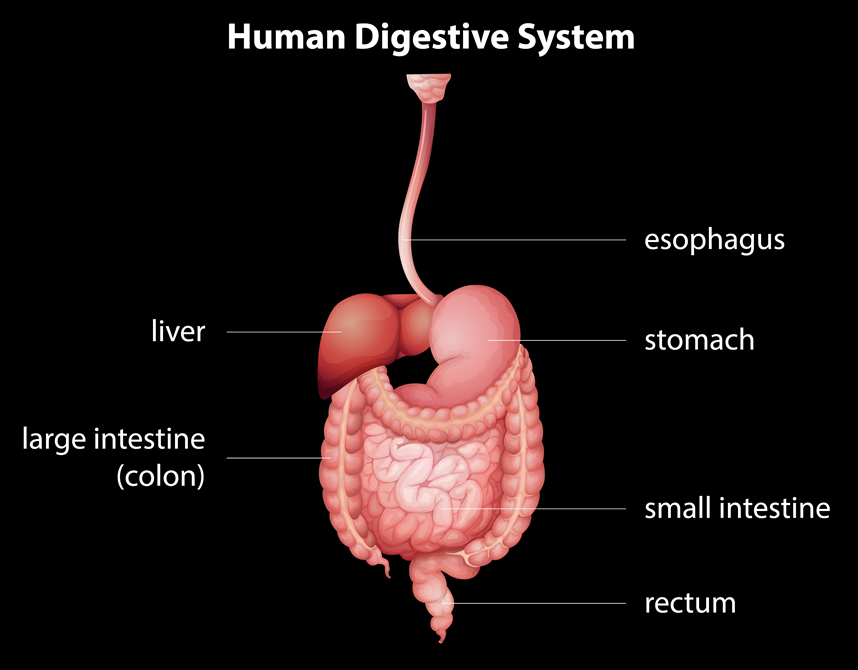
Root Cause of Bloating: Poor Digestion
Poor digestion is so common, it’s virtually epidemic. So many people struggle with chronic stomach pain, acid reflux, diarrhea, bloating, and constipation that there is an entire aisle dedicated to “stomach care” products at your local pharmacy. While these over-the-counter drugs may work to relieve symptoms, they won’t address the root cause of the problem.
Poor digestion is often the result of:
Not initiating digestion properly: It takes about 20 minutes for your brain to register that you’re full. When you eat too fast, you take in more food than your digestive system can comfortably process in one sitting. Also, eating too fast usually means not chewing thoroughly enough. When this happens, your stomach is left to do all the digestive work that should have started in the mouth. This can slow digestion and lead to chronic bloat. Furthermore, swallowing quickly means you’re likely to gulp down a lot of air, which can also lead to stomach distention.
Insufficient HCL: Hydrochloric acid production in the stomach is essential for breaking down your food so the nutrients from it can be absorbed and distributed throughout your body. Not having enough HCl acid is called hypochlorhydria, and it is a problem because it slows digestion time and makes it so that the rest of the GI tract has to work harder as well. It also encourages the growth of harmful bacteria and yeast since the acid normally acts as a protective barrier to the rest of the digestive system by killing off pathogens that might potentially produce gas and bloating.
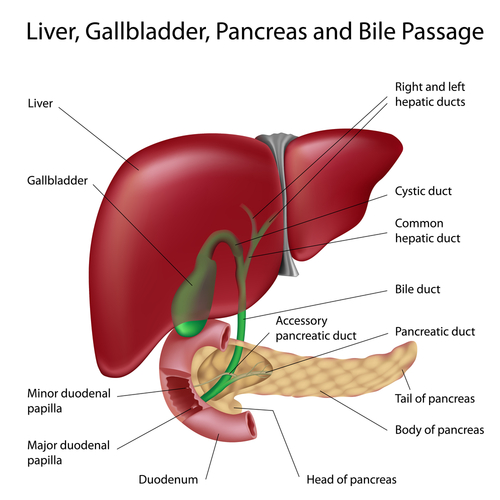
Insufficient Digestive Enzymes: Similar to stomach acid, digestive enzymes are also necessary to break down and absorb the nutrients in food. When you don’t make enough digestive enzymes, your body has to work extra hard to break down food and may even leave some larger particles that should have been digested. When this happens, bacteria, yeast, and other organisms in the gut can use it and produce gas, resulting in bloating.
Decreased Bile Production: In general, fatty foods tend to slow gastric emptying time and digestive activity. In order to process these foods, you need you adequate bile production and excretion, in addition to digestive enzymes. Decreased bile production hinders the already slow process of breaking down fats, allowing air and gases to accumulate and causing bloating.
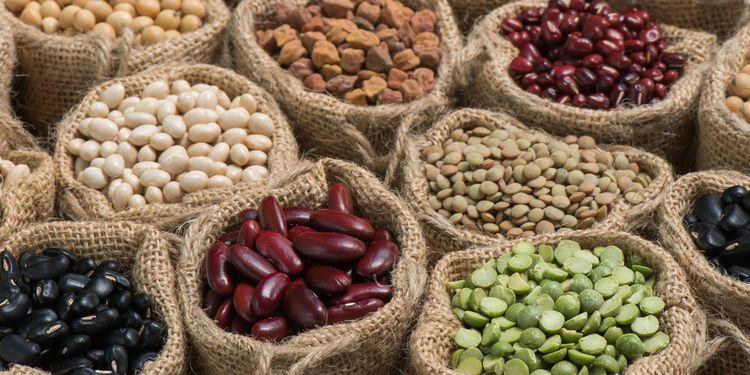
Root Cause of Bloating: Diet
Diet is a significant source of bloating, since there are potentially many triggers of bloating by means of increased water retention and gas production.
- Consuming large amounts of salt or processed foods will cause you to retain water, as your body is trying to dilute the salt to maintain electrolyte balance.
- A high carbohydrate diet will cause bloating, because carbs naturally cause your body to store water. The term carbohydrate literally translates to “carbon causing water absorption.”
- Particular foods such as cruciferous vegetables (broccoli, kale, etc.), legumes (beans, peas, lentils), and excessive amounts of fiber (psyllium) may be hard for certain people to break down and digest due to the fiber or certain types of sugars present, which will results in gas production leading to bloating.
-

PHOTO: AFRICA STUDIO/SHUTTERSTOCK.COM Sugar alcohols (xylitol, erythritol) used as sugar substitutes are not easily digested and can be fermented by gut bacteria to produce gas. They also bind water, leading to water retention.
- Alcohol consumption can cause bloating if you are sensitive to any of the constituents, such as gluten in beers and yeast in beer and wine. The sensitivity produces inflammation, which results in water retention. The carbonation can also cause bloating as well.
- Carbonated beverages cause bloating due to the carbonated gas that produces the bubbles being trapped in your stomach and intestines.

If you have a GI disorder or infection such as IBS, andy form of IBD, SIBO (small intestinal bacterial overgrowth), or Candidiasis, FODMAP-containing foods may give you trouble. FODMAP is an acronym that stands for “Fermentable Oligo-, Di-, Mono- Saccharides And Polyols,” which describes certain short-chain carbohydrates (sugars) and sugar alcohols.
These foods can be particularly difficult to digest and absorb, allowing them to travel through the GI tract where bacteria and yeast can digest and ferment them, producing gas. The primary categories include:
Fructans: Some examples are wheat, rye, barley, onion, artichoke, asparagus, beetroot, chicory, leek, radicchio, broccoli, brussel sprouts, cabbage, fennel, and chocolate.
Galactans: All beans and lentils are in this family.
Polyols: Most fruit, especially stone fruit, has these natural sugar alcohols, as well as mushrooms, cauliflower, and certain peas.
Lactose: Most milk and dairy products contain the disaccharide sugar lactose.
Fructose: All fruit contains some amount of fructose, the monosaccharide sugar.
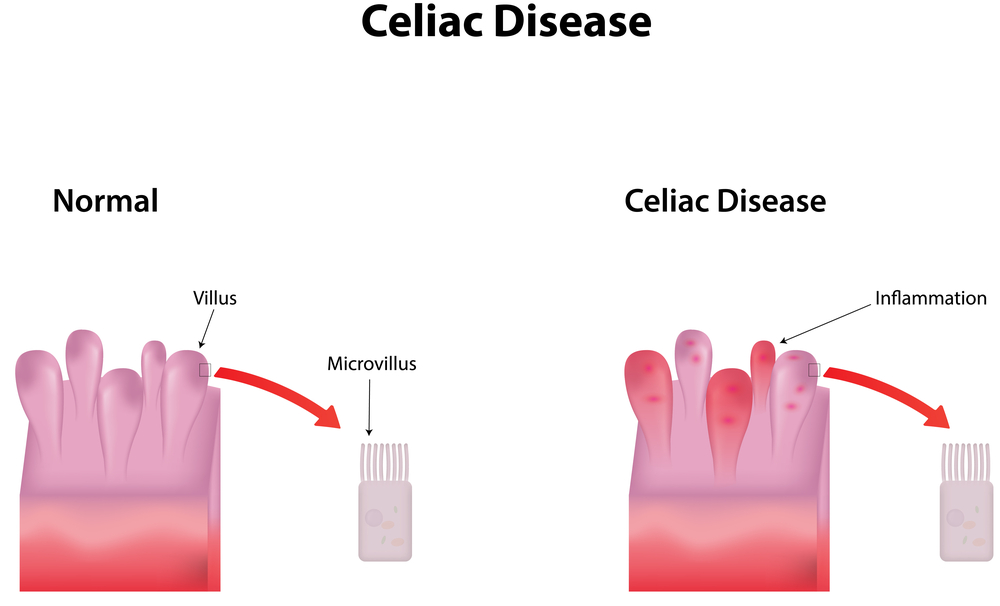
Root Cause of Bloating: Food Sensitivity and Allergies
Food sensitivities and allergies represent a significant root cause of bloating for several reasons.
This next sentence is so crucially important to understand. If you can’t digest and break down a food to an absorbable form, it can eventually be digested and fermented by organisms in the gut such as bacteria and yeast, producing bloat-inducing gases.
Further, these particles of food that are not fully digested cause the immune system to react to the protein peptides of the offending foods, producing inflammation that also contributes to bloating and water retention. This immune system response can range from a mild inflammation, as with a sensitivity reaction, to a full-blown antibody-producing attack on tissues, such as with Celiac disease (autoimmune reaction to gluten).
Some of the most talked about food sensitivities and allergies/intolerances today are gluten (both gluten sensitivity and Celiac disease) and dairy or lactose intolerance because their impact is widespread and significant in our population.
It’s important to note that you can develop a food sensitivity or allergy at any time in your life to any food, not just the common ones like gluten, dairy, soy, corn, eggs, shellfish, and nuts. GMO (genetically modified) or hybridized foods also represent a potent source for dysbiosis and the development of food sensitivities, as they are not as recognizable to your immune system as the original food form.
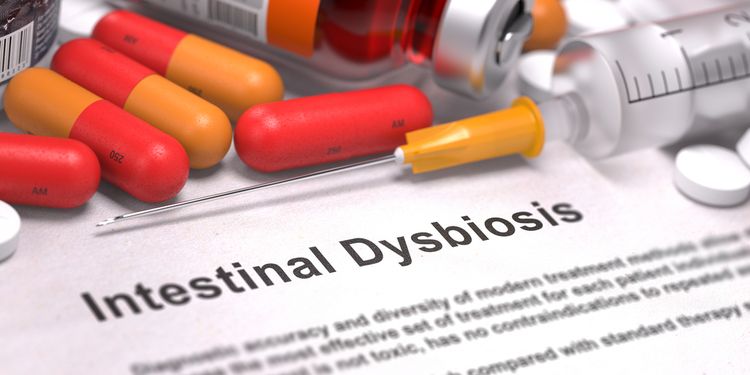
Root Cause of Bloating: Dysbiosis
We have ten times more bacteria in our bodies than we do cells. While most of these organisms are helpful and essential to our survival, some are harmful and cause significant damage to the delicate balance of the ecosystem that exists in your gut and helps regulate so much of your physiology.
Dysbiosis occurs when the harmful organisms, such as bacteria, fungi (yeast and mold), parasites, and viruses, take over the gut environment and change your physiology such that it favors their survival (and that of other pathogens) to the detriment of your own health.
Dysbiosis is a common cause of bloating. Dr. Robynne K. Chutkan, MD, FASGE explains that dysbiosis is “an imbalance within the various organisms present in our gut.”
The good bacteria in our guts are under near-constant assault from antibiotics, antacids, proton pump inhibitors, and NSAID pain relievers, resulting in bloating and chronic waste release in the form of excessive flatulence.10
Not only does dysbiosis lead to bloating and discomfort—without enough good bacteria in our gut, the less-than-beneficial strains of bacteria begin to overgrow. This compromises the integrity of our intestinal wall, which can lead to the development of allergies, autoimmune disease, and leaky gut syndrome.
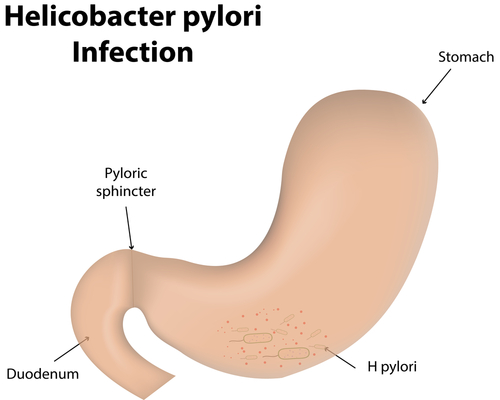
The primary infections associated with dysbiosis are small intestine bacterial overgrowth (SIBO), H. Pylori, Candida (yeast), and parasites that interfere with healthy digestion, resulting in gas, bloating, and chronic intestinal dysfunction.
Small Intestinal Bacterial Overgrowth (SIBO): SIBO occurs when there is an overpopulation of bacteria in the small intestine, where there should be relatively few bacteria compared to the colon. A diet high in sugar, refined carbohydrates, and alcohol can result in bloating when the bacteria digest the carbohydrates and ferment them, producing gas. This gas can build up throughout the day, leaving you looking like you’ve got a baby belly.

H. Pylori: Helicobacter pylori is a spiral-shaped bacteria that is estimated to inhabit two-thirds of the world’s population. Some people happily coexist with it while others develop chronic conditions, as it can become opportunistic. It alters immune function and stomach acid production to aid its survival while you experience reflux, indigestion, gas, bloating, and stomach pain.
Candida: Candida (yeast) is a fungus that in lives in your mouth and intestines to aid with digestion and nutrient absorption. It can become pathogenic and rapidly increase in numbers if your immune system is compromised from stress or illness. Yeast is another organism that ferments sugars and produces bloat-inducing gas.
Parasites: Certain parasitic infections, especially Giardia lamblia, are associated with bloating and gas production, particularly after meals.
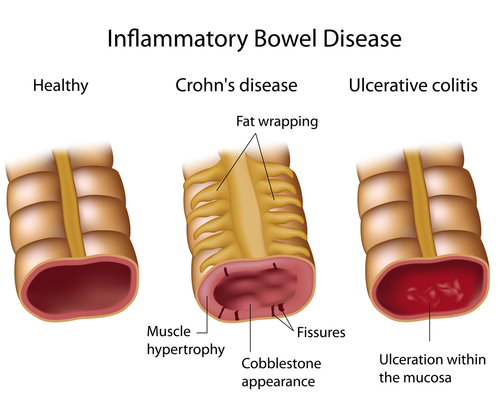
Root Cause of Bloating: Chronic Conditions
Most chronic conditions are rooted in inflammation and dysfunction of the gastrointestinal (GI) and immune systems on some level, and as such they are likely to produce bloating. Some of the conditions associated with bloating are autoimmune conditions, but impaired heart, kidney, and liver function and certain cancers such as ovarian, uterine, colon, stomach, and pancreatic can cause bloating due to fluid retention as well.
Crohn’s disease is an autoimmune condition that causes chronic inflammation in the small intestine or colon. As this disease progresses, the intestines narrow, which may lead to a bowel obstruction that causes severe bloating, weight loss, nausea, and vomiting after meals. Because of the insidious nature of this disease, it often takes years to get a proper diagnosis. “The lag between initial symptoms and diagnosis can be years, and bloating is one of the early symptoms,” says Dr. Robynne Chutkan, MD, FASGE.13

Celiac disease is another autoimmune disorder where a reaction to gluten causes systemic illness that can manifest in a range of organ systems.3 This results in inflammation of the small intestine, where partially-digested gluten proteins contact the gut immune system.
This immune response extends beyond just a direct response to the exogenous substance (the gluten), including a potent and multifaceted immune response to autoantigens (self antigens), resulting in substantial collateral damage to the structure and function of the gut and other organs.4 The changes in the intestinal lining along with the inflammation, leaky gut, and dysbiosis predispose you to bloating.
Irritable bowel syndrome (IBS) is a very common gastrointestinal disorder that is estimated to present in up to 15 percent of the global population.12 IBS is considered a functional disorder because the nerves that control digestion and gut movement do not function properly, causing the body to either eliminate waste products too quickly or too slowly. Often, those with IBS will have dramatic fluctuations in bowel habits. One day, they may experience chronic and debilitating diarrhea. The next day (and for a few days after), they may not be able to evacuate their bowels at all. In addition to fluctuating bowel habits, those with IBS often experience chronic abdominal pain and bloating.
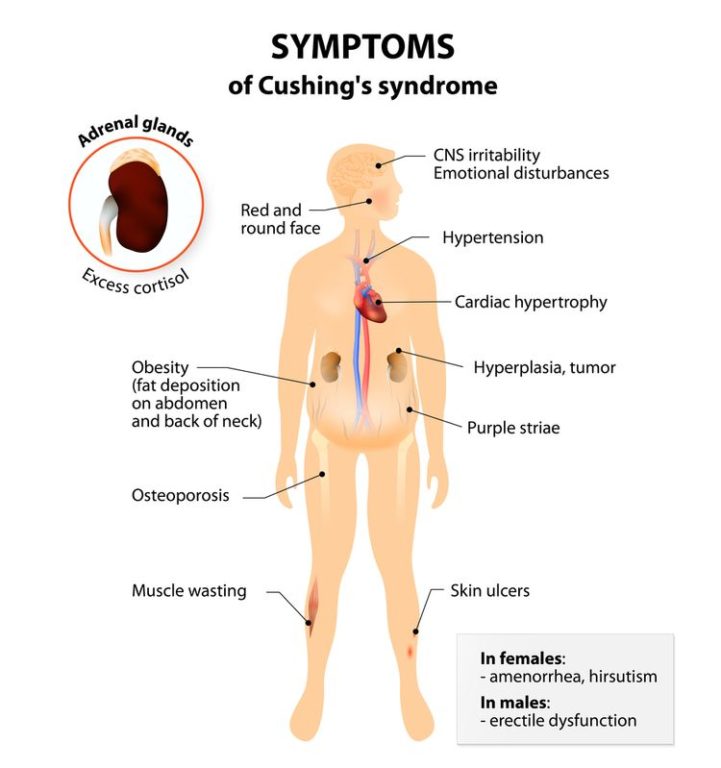
Root Cause of Bloating: Hormonal Imbalances
Hormonal imbalances can be a frustrating cause of bloating because they are not always easily identified and can produce inflammation, as well as shifts in fluid balance.
While many hormones are implicated in fluid retention and bloating, estrogen is the most significant, as it naturally causes you to retain fluids. Reproductive-age women with estrogen dominance often struggle with chronic bloating and weight gain.
High levels of estrogen are associated with significant fluid shifts that cause bloating, and balancing the estrogen with progesterone reduces the swelling and bloating.
Hypothyroidism may also lead to bloating and other digestive problems since it has been linked to estrogen dominance in premenopausal women aged 35 and over.11
For men, high levels of testosterone, especially when taken supplementally, can cause bloating due the conversion to estrogen via the enzyme aromatase. Aromatase is an enzyme that is most prevalent in fat cells that facilitates this conversion, so if you are overweight, the chances of converting to estrogen are increased.
Using fertility drugs such as Clomifene or HCG to induce stimulation of the ovaries to produce eggs may result in Ovarian Hyperstimulation Syndrome (OHSS) since they cause estrogen to rise substantially, especially in women with PCOS who already have hormone imbalances. Women with PCOS can also experience bloating due to conversion of testosterone to estrogen.
Having high levels of cortisol in your body, whether from stress, hypercortisolemia or Cushing’s disease, or medication such as Prednisone or Cortef, can cause fluid retention and bloating as well due to the shift in hormone balance. High cortisol will lower progesterone levels, which counterbalance the estrogens implicated in fluid retention. Additionally, high cortisol can lower thyroid hormone, producing the same effect.

Natural Relief from Bloating
Chew your food thoroughly: Digestion begins in the mouth, which why it’s important to chew your food thoroughly before swallowing. Not doing so forces the stomach to do all the work, which can slow digestion and cause bloating.3
Take it slow with fiber: Fiber is very good for your health, but it’s possible to overdo it. Elissa Goodman, certified holistic nutritionist, says, “Adding too much fiber too fast is the fastest way to pain and bloating.” Your body needs at least one month to adjust to a high-fiber diet.4 When adding fiber such as psyllium to your diet, do it very slowly so your body can adapt.
Skip the carbonated beverages: Drinking too many carbonated beverages fills your gastrointestinal tract with air and gas, which can lead to bloating.
Take a digestive enzyme: Jordan Reasoner suggests using a digestive enzyme if you have low-grade inflammation, bloating, intestinal damage, frequent diarrhea and/or constipation, an “oily toilet,” or see any undigested food in your stools.5

Reduce “bloating” foods: Avoid foods that cause gas production such as broccoli, kale, cabbage, cauliflower, beans, peas, and lentils until you resolve your bloating issues. Avoid high salt and processed food intake as well.
Cook your vegetables: The cooking process helps break down some of the fiber, making it easier to digest.
Drink water and eat bloat-relieving foods: Melons, citrus fruits, and pineapple all have high water content to help flush the body of excess sodium.
Take probiotics: Having lots of the good bacteria present will not only help you digest your food properly, it will also help you avoid GI infections or imbalances such as SIBO that contribute to bloat.
Try activated charcoal: Using activated charcoal for 3-5 days will help absorb toxins and gas. Use 2 hours after meals so it doesn’t interfere with nutrient absorption.
Needless to say, there’s a LOT you can do to reduce that tummy swell. Taking even 1-2 of these steps should get you on your way to feeling better, and once you see results the desire to improve only gets stronger.

